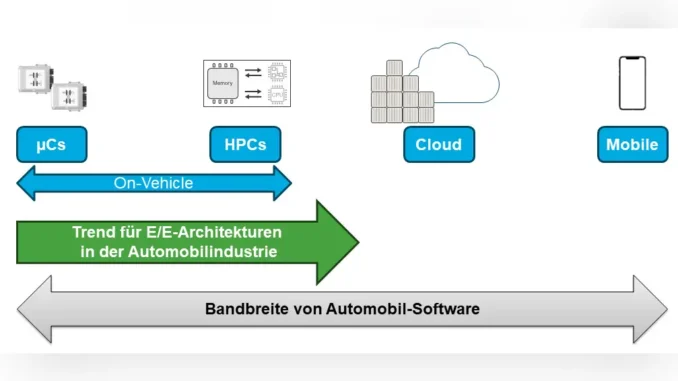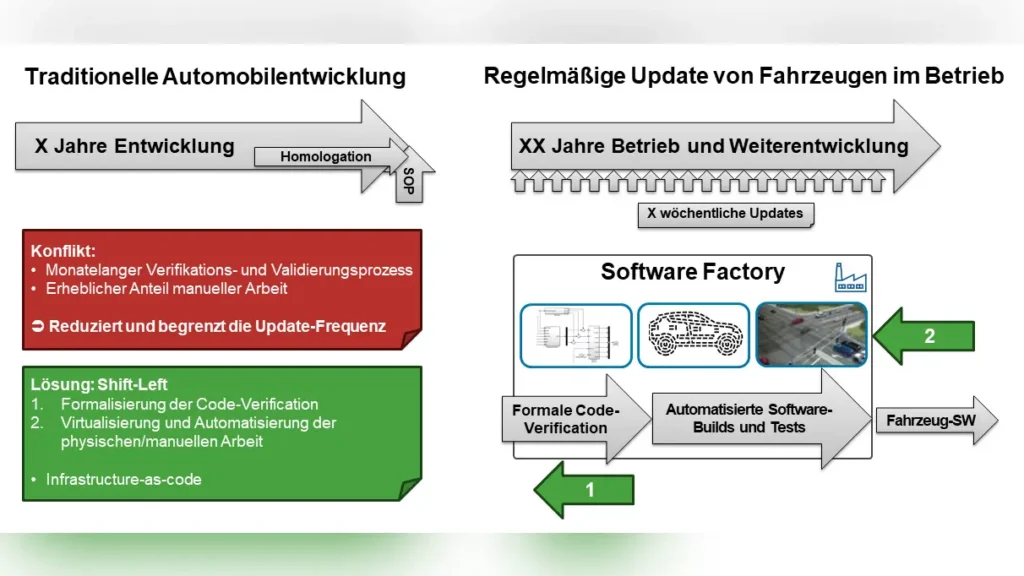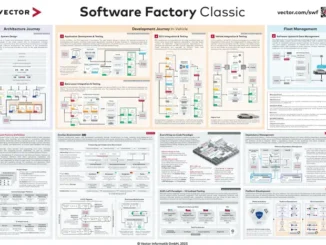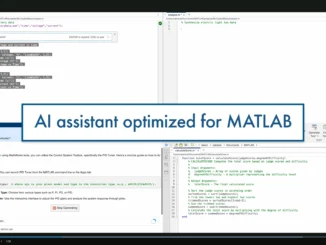
In order to master the increasing complexity of vehicle software development, Robert ter Waarbeek, Industry Manager Automotive EMEA at MathWorks, advises automotive companies to work closely with partners (software providers and suppliers) to adapt development processes and tools efficiently and in the best possible way to the new requirements. This allows automotive companies to focus their resources on differentiating vehicle functions.
The highly automated and robust environment for software development, integration, validation and release, which is often referred to as a „software factory“, marks a decisive advance in software development. This tried and tested concept is already being used in the automotive sector. It shortens development cycles and allows updates to be provided on a regular basis. In the automotive environment, however, safety-critical systems have special requirements, for the fulfillment of which established processes exist. However, the integration of these requirements with those of the software-defined vehicle (SDV) in the software factory is new.
An important component in solving this challenge is the expansion of the software factory with simulation models of vehicles and their components. This enables the automated validation of the behavior of the overall system, taking into account the physical properties of the vehicle. Although this approach cannot completely replace physical tests such as test drives, it significantly reduces their number and enables more frequent software updates without jeopardizing vehicle safety.
Thanks to largely automated, early tests and verifications (shift-left) as well as automated build processes, the software factory can be adapted to the requirements of homologating safety-critical software, which can currently take several months in traditional development. More frequent updates are thus possible without compromising on security. This also allows a rapid response to security vulnerabilities or cyber attacks. The reproducibility of the software factory improves both the transparency of the processes and the quality of the software produced.

Shift-Left enables the high update frequencies required for SDVs. (© Mathworks)
DevOps rethought: quality assurance in continuous cycles
The DevOps model is also increasingly finding its way into vehicle development and represents a natural extension of the software factory: The development process no longer ends with the start of vehicle production, but extends over the entire life cycle of the car. This means that the software can be continuously monitored, updated and improved even after delivery. To this end, operating data from the vehicle fleet provides valuable information that can be incorporated into the development of updates. Simulations based on this data help to analyze incidents and critical driving situations and to better understand their causes. The large volumes of data collected from the fleet are processed efficiently via cloud platforms with elastic resources. Based on these analyses, necessary updates are then developed, the corresponding software components are recreated and validated via simulation. Finally, only the required software components are transferred to the vehicle. This extended DevOps approach integrates operational data directly into the development process and thus contributes to safer and more efficient vehicle use.
Vehicle development requires new approaches
The automotive industry’s shift towards SDVs requires a rethink of development processes and the introduction of integrated, flexible approaches. Engineers and developers should maximize the reusability of software, ensure the adaptability of vehicle functions and enable faster, more frequent updates to keep vehicles at the cutting edge of technology even after production.
To achieve these goals, strong partnerships with and between software providers are essential. Partners such as MathWorks provide not only the technical expertise, but also the customized tools and development environments to handle the complex requirements of SDVs. If implemented correctly and in good time, automotive manufacturers can turn the vision and innovative power of SDVs into reality. (oe)
MathWorks experts will be available at these trade fairs to provide further information and discuss the topic of SDVs:
- MathWorks booth (Nr. 31) mit Networking Area (Cocktail Bar)
- Keynote von Jim Tung, MathWorks Fellow, zum Thema „The Roadmap for Software-Defined Vehicles and Disruptive Technologies“
- Vortrag von Tito Tang, Application Engineer: “A New Era for Software Verification. Heterogeneous Multicore Compute with Model Based Design & Virtual ECUs”
SDV Europe – Enabling the Software-Defined-Vehicle (1. – 3.
Dezember 2024 at the Hotel Palace Berlin)




